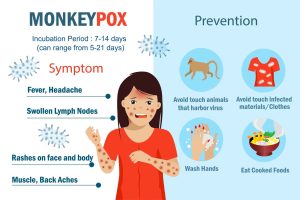 Employers have been advised to develop an emergency response plan for monkey pox (mpox), so they are better prepared to manage a potential outbreak of the infectious disease, especially any strains that have not been reported yet in the UK.
Employers have been advised to develop an emergency response plan for monkey pox (mpox), so they are better prepared to manage a potential outbreak of the infectious disease, especially any strains that have not been reported yet in the UK.
Monkeypox is a viral disease caused by the monkeypox virus, which is related to the smallpox virus. It primarily spreads through close contact with infected animals or humans, contaminated materials like bedding or clothing, and respiratory droplets. Symptoms can include:
The rash usually goes through several stages before forming scabs and falling off, and the illness typically lasts 2-4 weeks.
What to do if you catch it:
Monkeypox is generally mild but can be more severe in people with weakened immune systems, young children, and pregnant women.
Here is a link to an article written by IOSH.
UK employers advised to develop emergency response plans for mpox | IOSH magazine
If you require further information, contact us.